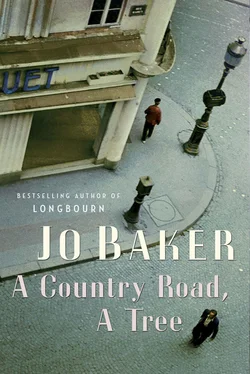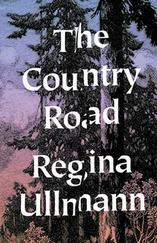“No.” The farmer raises his glass in a toast. They chink. They both drain the dregs. The liquid is thick and crunches with grains of sugar.
—
Suzanne has wedged a chair in between the bed and the window, for the light. A bolt of thick grey wool is spread over her knees and the counterpane. It’s a blanket; she is under commission to turn it into a coat. She is hand-stitching the whole thing. It’s trying to the eyes and on the hands. She looks up when he comes in; she says good evening, she notices the bandage. Tuts.
“What did you do now?”
“It’s nothing. Madame cleaned it up, so…” She doesn’t offer any further comment, so he just continues, “…it will be fine.”
He opens his bag, wincing, and lifts his supplies out on to the bed. The room is stuffy and cold, and there are voices to be heard from beyond the wall. She gets up and folds the fabric away, stabs her needle into it. Kneading at a shoulder muscle, she inches round the edge of the bed to inspect the haul.
One-handed, he unfurls a parcel of waxed paper. A clutch of olives. He unfolds another napkin and there is a small, fresh goat’s cheese and a cube of quince jelly. He lifts out a wine bottle; it’s unlabelled, the cork already drawn then shoved halfway back in. He plucks the bottle open, sloshes wine into a tooth glass, hands it to her. He sits. The mattress dips. The nest of olives tips over sideways, the cheese slides downhill towards him and he has to catch it and put it back. She hands him the glass. When he lifts his elbow to drink, she has to lean away. No room to park his arse, no room to lift an elbow, not even certain he can still tell one from the other any more. His head is locked solid with it all, with the weeks of it; the tumblers of his mind are rusted and they’re stuck and he can’t make them shift, and he can’t think for all the closeness, the crowding, everything jammed up around him and yet nothing within reach, everything bundled and boxed and getting under his feet and in his way.
“We are invited over for dinner on Saturday, to the Bonnellys’,” he says, rubbing at his eyes.
“Oh. Good.” She takes the glass off him again and sips.
He divides the olives, the cheese, the preserve, on to the two napkins. There is an extra olive so he gives it to her; he breaks the cheese into uneven pieces and sets the larger portion on her napkin. He hands the meal to her. They eat wordlessly, crumb by crumb, pausing to spit pits into their palms. After the last sticky swallow, there is silence between them again.
He holds up the bottle; she proffers the glass. The wine sloshes in.
“They seem to be very pleasant people,” he manages.
“Oh yes,” she says.
“Generous, too.”
“Good.”
“All this for just an afternoon’s work.”
She blinks at him. “I am doing what I can, you know.”
“I know.”
“I am going mad here, stuck here, stuck with this. My hands hurt.”
He nods. He knows.
“Just like you to be like that.”
He hadn’t realized that he was being like anything. “What do you mean?”
“Nothing ever touches you.”
She’s flushed now. “In truth, I think it’s all the same to you, all of it. If we stay in Paris and die or if we hide in a hole here and go mad, and then die all the same. You do not even notice.”
“I am not finding it easy, Suzanne.”
“Pft.”
“What?”
She looks at him, hard and level, cool with disappointment. She could say: I saw your notebook, back in the apartment, full of nonsense. You spend your time doodling and scratching things out. That is just how you are. You won’t make anything of anything at all.
But she says, “And now we are stuck here, caught like rats in a trap in this dreadful hotel. Even with all the trouble and fatigue of getting here, we are still not safe.”
“We’re alive. So we’re rather lumbered with the rest.”
“You don’t seem to care.”
“You think we should stop, then?”
“Stop?”
“Stop. Just — give up.”
She makes that movement of the mouth, the lips bunched together, the corners turned down, which passes with her sometimes for a shrug.
He could say: I know what stopping looks like. It looks like a man stepping out into the sky. It looks like the ground racing up to meet you. It looks like a black comma on the cobblestones. It looks like a pool of blood.
But he says, “Is that what you suggest?”
“I’m not suggesting anything,” she says.
“No.” He drinks, sets the tooth mug aside, picks up a crumb of cheese. His injured hand rests limp in his lap. “I see that.”
She glares at him, brittle and unhappy. Too much store had been set upon the destination. Continuance here, inhabitance — that had barely crossed her mind. Now they’re stuck with the day-to-day of it, the day-after-day of it, for as far as the eye can see, and it might as well be eternity; and they are tangled together, twining round each other; they are all elbows, feet and claws.
“Do the Lobs have a piano, perhaps, out at Saint-Michel?” he asks.
“Maybe.”
“Perhaps you could go and play there. That would be good for you. They wouldn’t mind.”
She nods.
“Maybe you could even take pupils again. There must be young ones around here who’d otherwise miss out. You’ve always loved teaching. That would help.”
She looks at him. Then she says, “You’re so much better at this than me.”
“No,” he says. “No, I’m not.”
She nods, though. And then she says, “Perhaps we can find somewhere more out of the way. A house just outside town. So if the place is raided, we won’t be stuck here like fish in a barrel.”
“I’ll ask a friend.”
Suzanne blows a puff of breath.
“What?”
“A friend.”
“What?”
“You.”
“What?”
“You and your friends.”
“What do you mean, me and my friends?”
“You make friends like dogs make puppies.”
He frowns at this. Promiscuously? With pleasure? By the half-dozen? He doesn’t ask. But Anna Beamish will have an idea or two where they might look for more out-of-the-way accommodation. And he doesn’t mention his unsettling conversation with Monsieur. No point in meeting that particular trouble halfway.
CHAPTER FOURTEEN LA CROIX, January 1943
This is the place, then: the little house on the edge of town. He climbs the creaking stairs. The wind rattles the shutters against their latches. He has Shem’s old coat on, a muffler drawn up over his mouth and nose and dampened by his breath.
The upstairs room swells wide and dim, slope-ceilinged, with a window in each gable. There is a bedstead, an armoire, a small table and chair. The walls are rose-painted plaster. Beyond the back window, there’s just rattling, tormented branches, and black birds tumbling and skittering about. Looking out of the front window, across the road, the ground falls away sharply, so he stands now above the treetops and can see all the way across the valley to the distant mountains beyond. From here, turn right and walk ten minutes into town. Turn left and the nearest house is Miss Beamish’s, only just in sight, down at the crossroads.
This is a pool of space; this is a silence wide enough to swim in. If writing could happen at all, in these days, it would happen in a place like this. Here, perhaps, he could make a little slime to ease himself along.
He hears their voices rising up from the garden. Suzanne’s, as well as those of Marcel and Yvonne Lob. The professor has been doing great things with the grounds at Saint-Michel; he is not only supplying their own needs, but selling off the excess for a decent profit in Apt. Of course it is the right thing to do, to make the garden here profitable too. But what alarms him is the time that it implies. The waiting. That the seasons will have slid along from winter through spring and summer and back to autumn once more, and they’ll still be stuck here, eating garden peas and tomatoes and cooking their own onions in a stew. That by then the worst will not have happened, but then neither will anything else.
Читать дальше










